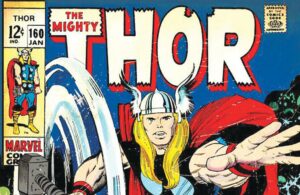
Thor Odinson thundered into the pantheon of superheroes with a legendary entrance in Journey into Mystery #83 back in 1962. This wasn’t just any debut; it marked the arrival of a character who would become a cornerstone of the Marvel Universe. The brains behind this bold new figure were none other than artist Jack Kirby, writer Stan Lee, and scripter Larry Lieber, a trifecta of comic book genius.
This mighty hero didn’t spring from thin air. Instead, he was a thoughtful adaptation of the Norse deity of the same name, and Kirby, Lee, and Lieber didn’t shy away from infusing their creation with elements straight out of Norse myth. It was a convergence of ancient legend with modern storytelling that reshaped the superhero landscape. You’re going to find out about how they translated Thor’s deity attributes into the characteristics of a comic book hero.
After his initial splash, Thor captivated readers’ imaginations to the extent that he quickly transcended being a mere guest star. Fast forward to 1966, and Thor was wielding Mjolnir in his own self-titled series with Thor #126, cementing his status as a headlining act in Marvel’s ever-expanding theater of heroes.
Thunderous Lineage: The Asgardian Royal Family
Thor’s story isn’t just about cosmic battles and heroics, it’s also deeply rooted in his Asgardian lineage. Born to Odin, the All-Father and ruler of Asgard, Thor is the heir to an ancient and powerful dynasty. But, unlike traditional Norse lore where Thor is the son of Odin and Fjorgyn (Frigga), Marvel introduced a twist. In the comics, his mother is not Frigga, as many would assume, but rather Gaea, the Earth goddess, emphasizing his connection to both Asgard and Earth.
Raised in the grand halls of Asgard by Odin’s wife, Frigga, Thor grows up believing her to be his mother. Frigga’s nurturing of Thor is instrumental in shaping his moral compass and instilling in him the virtues befitting a future king. Although lesser known than her husband and son, Frigga’s role is pivotal in the continuation of Asgard’s legacy through her wisdom and guidance.
befitting a future king. Although lesser known than her husband and son, Frigga’s role is pivotal in the continuation of Asgard’s legacy through her wisdom and guidance.
In a ceremony laced with enchantment and spectacle, Odin bequeaths to his son the mighty Mjölnir (pronounced Mee-ol-neer), a magical hammer that becomes synonymous with Thor’s identity. The hammer possesses a unique enchantment: it can only be lifted by those who are deemed ‘worthy.’ This becomes a recurrent theme in Thor’s narrative, challenging him to prove his worthiness through various trials and tribulations.
The comics richly portray Asgardian culture, with its pantheon of gods and creatures, epic tales of valor, and a society that values strength and honor. Thor’s background here is essential, providing context to his later adventures on Earth. It paints a picture of a realm that’s majestic, yet bound by traditions and ancient rules that even gods must adhere to.
A Hero’s Trial: Banishment and Awakening
I’m going to take you through the defining moment that truly shaped Thor into the hero we admire today. His father, Odin, saw a flaw in his brave and mighty son: arrogance. Deciding that Thor needed a lesson in humility, he cast him down to Earth. But this wasn’t a simple time-out; Odin wanted Thor to learn compassion and self-sacrifice. So, he stripped his son of his memories and gave him a new identity as Dr. Don Blake, a lame physician whose challenges were a far cry from the battles of Asgard.
His mortal guise leads him to a cave in Scandinavia, where fate has placed an unsuspecting walking stick. When danger looms, a desperate tap on the ground transforms the stick into the mighty Mjölnir, and Dr. Blake into the God of Thunder. It’s a clever narrative device, the walking stick—a symbol of his frailty turned into a conduit of vast power.
In my opinion, this duality is what makes Thor so fascinating. The perpetual link between the hammer and hero serves as both boon and bane. Thor discovers the catch: should he be separated from Mjölnir for more than a minute, he reverts back to Dr. Blake. It’s a vulnerability that adds depth to his character and layers to his adventures, making his struggles more than just celestial conflicts; they mirror our own daily battles of balancing different aspects of life.
Don’t worry too much about that vulnerability dampening his heroism, though. It actually enhances it. Each time he taps his cane, each battle he wages, he betrays no shred of his divine heritage—all while embodying the very virtues Odin hoped to instill. This is where I see the true essence of Thor: not as a faultless deity, but as a being striving towards betterment. And that, my friends, is what paves the way to the intricate weave of relationships he forms on Earth, especially the one that tugs most on his heartstrings—which you’re about to dive into next.
Matters of the Heart: Thor’s Earthly Bonds
In the vibrant pages of Marvel Comics, Thor’s story is as much about his godly duties as it is about his personal relationships. Jane Foster, originally a nurse in the comics, weaves into Thor’s life creating a complex and gripping narrative. Their relationship is packed with tension; she loves both Thor and his earthly alter ego, Dr. Don Blake, unaware they’re the same individual. This love triangle forms a recurrent theme, showcasing Thor’s human vulnerabilities.
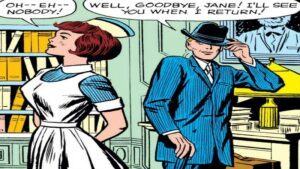 Thor’s disguise as the lame Dr. Don Blake establishes a relatable, human aspect to his character. It’s this humanity that becomes the backdrop for a slew of personal challenges, of which his romance with Jane is only a part. Struggling to maintain his duality, Thor experiences the limits of love and duty. Jane represents a life Thor yearns for, but one he knows can’t be fully realized as long as he’s burdened with celestial responsibilities.
Thor’s disguise as the lame Dr. Don Blake establishes a relatable, human aspect to his character. It’s this humanity that becomes the backdrop for a slew of personal challenges, of which his romance with Jane is only a part. Struggling to maintain his duality, Thor experiences the limits of love and duty. Jane represents a life Thor yearns for, but one he knows can’t be fully realized as long as he’s burdened with celestial responsibilities.
The drama between Thor and Jane extends beyond their individual moments together. It influences Thor’s actions as a superhero and pushes the character toward growth. The comics paints his time on Earth as one of both heroism and introspection, where the character not only battles villains but also grapples with the question of balance between his two worlds.
Jane Foster’s presence isn’t just pivotal for Thor’s emotional evolution; she also acts as a bridge to humanize the god of thunder to comic book readers. Her perspective allows us to see the mighty Thor in moments of doubt, joy, and pain, revealing a depth that power alone couldn’t convey. Over time, this relationship isn’t just a source of tension but becomes a driving force in many stories in the Thor narrative.
Adaptations and Rivalries: From Comics to the Silver Screen
So my question to you today is, how well do you think Thor’s legacy has been adapted from the comic pages to the big screen? Marvel’s greatest strength may very well be its adaptability, reshaping stories to fit the times while honoring their roots. The MCU’s depiction of Thor embodies this ethos, tweaking his origin story and role in human society for a new audience. His battles are no longer just with trickster gods or otherworldly monsters but also with himself, his identity, and his place within a team of earthbound heroes.
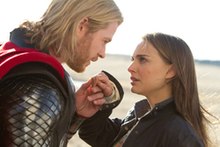 Don’t worry too much about the differences between the comics and movies; both mediums offer unique takes on the Thunder God’s tale. The comic book Thor gives us a sweeping saga crammed with lore, while the MCU presents a more streamlined, personal story that tethers the mythical to the modern. Choose something that resonates with you, whether it be the detailed layers of comic narratives or the cinematic spectacle and emotional resonance of the MCU.
Don’t worry too much about the differences between the comics and movies; both mediums offer unique takes on the Thunder God’s tale. The comic book Thor gives us a sweeping saga crammed with lore, while the MCU presents a more streamlined, personal story that tethers the mythical to the modern. Choose something that resonates with you, whether it be the detailed layers of comic narratives or the cinematic spectacle and emotional resonance of the MCU.
In the woven narratives of comics and film, Thor’s constant struggle with Loki continues to be a central theme. This fraternal rivalry elevates the stakes in both mediums, providing a rich, complex dynamic that fuels the narrative engine across Thor’s adventures. In comics, Loki’s sinister machinations label him the god of evil, but the films introduce him with a somewhat sympathetic edge, painting him as the god of mischief. Both interpretations present a compelling antagonist whose actions propel Thor’s growth as a character. In both media, Loki’s mischief was the driving force that brought the Avengers together. While the plot differed from comics to film, Thor was there to bring down his evil half brother.
I hope this exploration of Thor’s origins and adaptations has given you a deeper appreciation for the character. Whether through comic panels or cinematic frames, Thor’s journey from his mythical roots to becoming a beloved icon has been nothing short of thunderous. The stories might change, the characters may evolve, but the essence of what makes them compelling remains the same – the timeless struggle of heroism, identity, and family.
What are your thoughts and memories of Thor? Share them with us in the comments. I will be happy to hear form you!
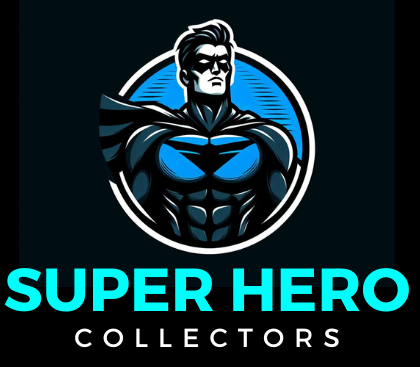
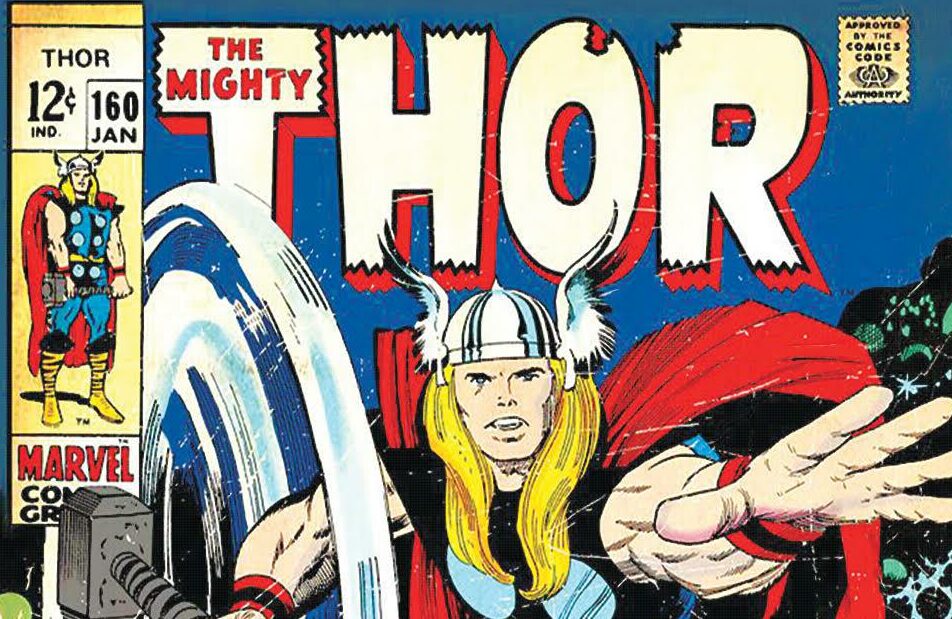
Hey I have always been a marvel fan grew up watching X-Men spider-man. But as I got older into marvel more I found out about thorr later probably a bit later because he’s not as common. He’s an asguardian so X-Men don’t really deal with that much. But he’s definitely a very cool character I think the asguardians are cool.
Thank you for your comments and reading my post. Thor has been around since the early 60’s and headlined his own magazine for years, as well as being a part of the Avengers. As an Avenger, his path did cross with some mutants every once in a while. Asgard is pretty cool. I probably should write about Asagard and it’s colorful citizens.
I hope you come back for more of my super hero content.
-Scott
Just scrolled through your piece on Thor’s epic start in Marvel Comics, and man, what a ride! The key takeaway? It’s all about how Marvel transformed a Norse god into a superhero icon. The blend of myth and modern heroics is just genius.
Here’s a question for you: Given Thor’s deep roots in Norse mythology, do you think Marvel’s reimagining of his story dilutes the original myths, or does it give them a fresh lease on life for a new generation? Can’t wait to hear your thoughts on this clash of the titanic tales!
Hi KW – I’m glad you enjoyed this post on Thor’s start in the comics. I really don’t think the comics dilutes the Norse mythology. Within mythology, there are often different tales that may differ from each other. That is what makes them myths. So Marvel’s borrowing from Norse mythology shouldn’t harm it any. You may have given me an idea for a future post!
Please come back for more superhero content! – Scott
Hi Scott, thank you for this beautiful account of the character Thor. He is indeed an alluring character, which I feel greatly in tune with because I’m of Norwegian stock, my ancestors were Vikings, and my family name is Thorp! I also work with music and sound therapy and often cite Thor’s hammering as a fabulous natural wake-up call from the Universe. It truly wakes people out of their sleep hollows.
Your passion for this character shines straight through your writing and research. I’m thrilled that you can enjoy what you’re doing on your website so deeply, share your passion and make some money simultaneously.
One question: Do you feel as if you are Thor? Does identifying with this dynamic character help you to get through life’s ups and downs?
Great! Enjoyed your perspective on this universal archetype.
Blessings and Success.
Linden
Hi Linden,
I’m glad you were able to identify with Thor, given your heritage. He is certainly one of the great Marvel heroes. I would not say that I identify with Thor, even though I find his stories in Marvel compelling. I have other more satisfying ways of coping with life’s ups and downs. I look at the Marvel comics and its characters as pure entertainment that I enjoy sharing with others.
I hope you will come back for more superhero content!
-Scott
Hi Scott,
I really enjoyed your detailed breakdown of Thor’s origin story and his evolution in Marvel Comics. The balance between his godly duties and human relationships adds such depth to his character.
As a fan who has followed Thor from the comics to the big screen, I’ve always been intrigued by the creative interpretations of his story. Do you think the movies have managed to capture the essence of Thor’s character as originally envisioned by Lee, Kirby, and Lieber, or have they taken too many liberties?
Thank you for your work and for sharing this piece!
Warm regards,
Makhsud
I’m really glad you enjoyed the post. The original comic writers did bring a lot of depth over the years to Thor. The MCU definitely took a lot of liberties but still managed to capture his depth. The movie accurately portrayed him as being proud and banished to earth. Odin didn’t put him into Dr. Blake in the movies. It would have been interesting to see how they did that. One aspect from the comics was changed in the movies. In the comics, the superheroes had a code that they wouldn’t kill anyone, not even the worst of villains. The MCU changed that. Of course, we know in Endgame that Thor killed Thanos in a fit of rage.
As always, thanks for commenting on my post!
– Scott
Awesome, here’s a perfect chance to add a bit controversy into mix..
Being a Scandinavian myself, the way Marvel studio is depicting Thor is a screaming miss in my opinion.
However, all is not lost. There’s one particular instance in my opinion, where they absolutely nailed Thor’s character both in appearance & attitude. It’s God of War Ragnarök game series. It’s just beautiful how they pulled it off.
As we all know, Thor is a giant himself – Towering over most folks due to his height, having strongman style body with a gut.
People call it fat. They’ve no idea what they’re talking about.
That’s the type of body capable of taking on a bear & living in the solitude of cold mountains.
Not a calorie-counting bodybuilder with six-pack abs to win beauty contests. This one is a destroyer in nature, a blunt force object, ready to wipe out your race without second thought.
His attitude only adds to it in that series. Showing up gods of war doorstep: “Can I come in? I have mead.” Walking over to his adversary & just dwarfing him with sheer size.
That’s a proper Thor, a bulky, intimidating giant slayer who inherently with his presence makes everyone stranding around him to shiver.
Dude also has a bunch of personal issues, making him even more complex than the surface reveals. Definitely a character with depth & unique quirks.
What’s your opinion on this? Do you think it’s a healthy idea to introduce widely known, epic character to the audience from a different angle like this? Or should we strictly stick to the already established, mainstream version of our hero?
Hi Henry!
Thank you for your input. I think with all fictional stories of heroes whether from mythology or war, there are always different stories that pop up, whether it be stories of Norse mythology or stories of merry old England (King Arthur and Robin Hood come to mind). Changes always seem to be made in the story from time to time. Even within Marvel comics, different authors brought different accounts of the characters and portrayed them differently.
I don’t think it is “unhealthy” that Marvel took a hero from Norse mythology and mixed it up some (okay, a lot!) to make it more colorful.
I hope you come back for more superhero content!
– Scott
Hi Scott,
Excellent article on Thor and excellent website on super heroes.
I was talking with my friend’s 7 year old son last Saturday about super heroes and he was asking who my favourite was. I told him mine was Superman and he said his was Spiderman.
I am going to send my friend a link to your site so he can share it with his son and he can look deeper into his super heroes and how he can become a collector.
Thank you for sharing and keep up the great work.
All the best,
Tom
HI Tom!
Thank you for checking out my website and reading my post about Thor. I used to watch Superman when I was a kid and read his comics. I still like him, but the Marvel universe and captured my attention over the years. Thank you for spreading the word about my site to other fans!
Please come back for more superhero content!
-Scott
Hello Scott,
Thor’s journey from the pages of comics to the silver screen has been quite remarkable, hasn’t it? It’s fascinating how Lee and Kirby drew inspiration from Norse mythology to create such an enduring character. And Chris Hemsworth’s portrayal in the MCU has contributed to Thor’s widespread popularity. Do you have a favourite Thor moment or storyline from either the comics or the movies?
Welcome back, Eric!
Absolutely, Thor’s evolution from the inked pages to the big screen is indeed an extraordinary journey, blending mythological roots with modern storytelling flair. Lee and Kirby’s fusion of Norse mythology with the superhero genre was a stroke of genius, giving birth to a character who stands the test of time.
As for Chris Hemsworth’s portrayal in the MCU, it’s undeniably iconic. His charisma and dedication brought the thunder god to life in a way that resonated with audiences worldwide, adding another layer of depth to Thor’s character.
As for a favorite moment or storyline, there are so many to choose from! From the epic battles against cosmic threats to the moments of introspection and growth, Thor’s journey is rich with memorable tales. Personally, I am drawn to the stories that involve Thor’s struggle with his half-brother Loki. From Loki’s schemes to usurp Asgard’s throne to moments of unexpected camaraderie and redemption, the Thor-Loki dynamic is a rich tapestry woven with layers of complexity and emotion. It’s a testament to the enduring power of storytelling that this timeless conflict continues to resonate with audiences across generations.
What about you? Do you have a favorite Thor moment or storyline that stands out to you? Do you have a favorite Thor-Loki storyline that particularly resonates with you?
Your comments are always welcome. I hope you come back for more superhero content!
– Scott
What an insightful journey through Thor’s evolution! The integration of Norse mythology into Marvel’s comic universe is truly fascinating. I’m particularly intrigued by the twist of making Gaea, the Earth goddess, Thor’s mother instead of Frigga. It adds a unique layer to his character’s identity.
The transition from comic to cinema is also captivating. The MCU’s interpretation offers a more contemporary portrayal, yet it still captures the essence of Thor’s mythos.
Here’s my question: Which aspect of Thor’s character do you find most captivating: his divine heritage and cosmic battles, or his struggles with human emotions and relationships, like his dynamic with Jane Foster? Let’s dive into the discussion!
Hi Hanna!
Thanks again for visiting and leaving a comment. I enjoy reading the stories that involve his friends like Balder the Brave, Fandral, Hogun, and Volstagg. Their adventures are always exciting as the battle the villains from other realms.
Please come back soon and share with your friends that enjoy the superheroes!
– Scott
Hello, I enjoyed reading your article on Thor’s journey through the comics and films. I also think it was a stroke of genius how the three artist, writers, and scripter could infuse Norse mythology into Marvel through Thor. I haven’t read as many comics, so I was unfamiliar with how Thor was created in the comics compared to the movies. I think it’s interesting how well the films were able to adapt so much from the comics to both stay true and relate to the modern era. One example is the change from Jane Foster from a nurse to an astrophysicist. I’m sure the idea of a female astrophysicist (or other such careers)was much less common in the 1960s than in the 21st century.
Hi!
I’m glad you enjoyed the post. It definitely is interesting how the screen writers adapted the story to fit today’s audience. The MCU producers really didn’t want to have any secret identities (except for Peter Parker, and even in the Tom Holland movies, there were many who knew his identity) so they changed the stories to move away from the aspect of the super hero story.
You are correct, most people in the 60’s thought women were mostly fit to be nurses, not biophysicists and such. Although it wasn’t unheard of! You may remember the 2016 film “Hidden Figures” which was about three important women in NASA during the early days of space flight.
I hope you come back for more superhero content! If you have ideas that you would like me to explore, please let me know!
– Scott
Your hopes have been realized because this article did bring a deeper appreciation for the stories of Thor. I love hearing about the differences between the comics and the movies. It’s interesting that Frigga is not his mother in the comics. Was Gaia a major character in the comics?
I also find the dual identiy as Dr. Don Blake fascinating. To waver between frailty and superhuman powers certainly offers a contrast that can highlight the struggles that many people face as they strive to improve themselves. Great writing, Scott!
Cheers!
Ryan
HI Ryan!
Thank you for reading and commenting! I’m glad you enjoyed the different aspects of the exploration into Thor’s beginning. In my reading of Thor in the comics, I have not come across very much activity from his mother Gaia, but that doesn’t mean she isn’t there.
If you enjoy this site, please share with family and friends.
– Scott